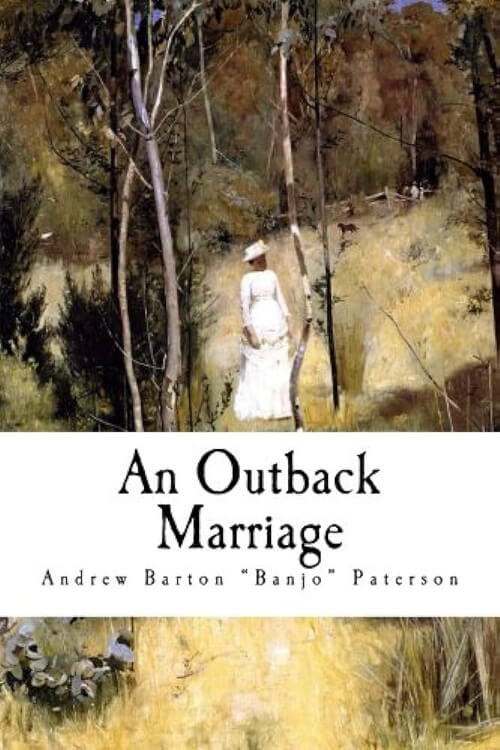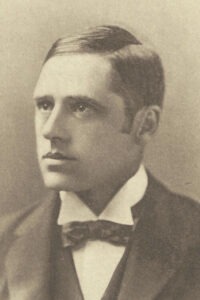
An Outback Marriage, A Story of Australian Life
It was a summer’s evening in Sydney, and the northeast wind that comes down from New Guinea and the tropical islands over leagues of warm sea, brought on its wings a heavy depressing moisture. In the streets people walked listlessly, perspired, mopped themselves, and abused their much-vaunted climate. Everyone who could manage it was out of town, either on the heights of Moss Vale or the Blue Mountains, escaping from the Inferno of Sydney.
In the Cassowary Club, weary, pallid waiters brought iced drinks to such of the members as were condemned to spend the summer in town. The gong had sounded, and in ones and twos, members shuffled out of the smoking room and went into dinner. At last, only three were left talking at the far end of the big, empty smoking room, like three small stage conspirators at the end of a very large robbers’ cavern.
One was a short, fat, red-faced man, who looked like a combination of sea-captain and merchant, and who was the local representative of a big English steamship company. His connection with the mercantile marine had earned him his nickname of “The Bo’sun.” By his side sat Pinnock, a lean and bilious-looking solicitor; the third man was an English globe-trotter, a colorless sort of person, of whom no one took any particular notice until they learned that he was the eldest son of a big Scotch whisky manufacturer, and had £10,000 a year of his own. Then they suddenly discovered that he was a much smarter fellow than he looked. The three were waiting for somebody. The “Bo’sun” had a grievance, and was relieving his mind by speech. He walked up and down between the smoking-room chairs, brandishing a telegram as he talked, while the attorney and the globe-trotter lay back on the lounge and admired his energy.
“I call it a shame,” he said, facing round on them suddenly; “I could have got up to Moss Vale for a day or two, and now old Grant of Kuryong wires me to meet and entertain a new chum. Just listen to this: ‘Young Carew, a friend of mine, on Carthaginian. Will you meet him and show him round; oblige me—W. G. Grant.’ I met the old fellow once or twice at dinner when he was in town for the sheep sales, and on the strength of that, he foists an unknown callow new chum onto me. People are always doing that kind of thing.”
“Leave his friend alone, then,” said Pinnock; “don’t have anything to do with him. I know his sort—Government House young man the first week, Coffee Palace at two shillings a night the second week, boiler on the wharf the third week, Central Police Court the fourth week, and then exit so far as all decent people are concerned.”
The Bo’sun stuffed the telegram into his pocket and sat down.
Read or download Book
Andrew Barton "Banjo" Paterson
Andrew Barton “Banjo” Paterson, CBE (17 February 1864 – 5 February 1941) was an Australian bush poet, journalist and author. He wrote many ballads and poems about Australian life, focusing particularly on the rural and outback areas, including the district around Binalong, New South Wales, where he spent much of his childhood. Paterson’s more notable poems include “Clancy of the Overflow” (1889), “The Man from Snowy River” (1890), and “Waltzing Matilda” (1895), regarded widely as Australia’s unofficial national anthem.
Early life
Andrew Barton Paterson was born on 17 February 1864 at the property “Narrambla”, near Orange, New South Wales, the eldest son of Andrew Bogle Paterson, a Scottish immigrant from Lanarkshire, and Australian-born Rose Isabella Barton, related to the future first prime minister of Australia, Edmund Barton. Paterson’s family lived on the isolated Buckinbah Station near Yeoval NSW until he was five when his father lost his wool clip in a flood and was forced to sell up. When Paterson’s uncle John Paterson died, his family took over John Paterson’s farm in Illalong, near Yass, close to the main route between Melbourne and Sydney. Bullock teams, Cobb and Co. coaches, and drovers were familiar sights to him. He also saw horsemen from the Murrumbidgee River area and Snowy Mountains country take part in picnic races and polo matches, which led to his fondness for horses and inspired his writings.
Paterson’s early education came from a governess, but when he was able to ride a pony, he was taught at the bush school at Binalong. In 1874 Paterson was sent to Sydney Grammar School, performing well both as a student and a sportsman. During this time, he lived in a cottage called Rockend, in the suburb of Gladesville. The cottage is now listed on the Register of the National Estate and New South Wales State Heritage Register. He left the prestigious school at 16 after failing an examination for a scholarship to the University of Sydney.
Career
Paterson was a law clerk with a Sydney-based firm headed by Herbert Salwey and was admitted as a solicitor in 1886. In the years he practiced as a solicitor, he also started writing. From 1885, he began submitting and having poetry published in The Bulletin, a literary journal with a nationalist focus. His earliest work was a poem criticizing the British war in the Sudan, which also had Australian participation. Over the next decade, the influential journal provided an important platform for Paterson’s work, which appeared under the pseudonym of “The Banjo”, the name of his favorite horse. As one of its most popular writers through the 1890s, he formed friendships with other significant writers in Australian literature, such as E.J. Brady, Harry “Breaker” Morant, Will H. Ogilvie, and Henry Lawson. In particular, Paterson became engaged in a friendly rivalry of verse with Lawson about the allure of bush life.
Later life and death
Just as he returned to Australia, the third collection of his poetry, Saltbush Bill JP, was published and he continued to publish verse, short stories, and essays while continuing to write for the weekly Truth. Paterson also wrote on rugby league football in the 1920s for the Sydney Sportsman.
In December 1938 Paterson was appointed Commander of the British Empire (CBE).
He died on 5 February 1941.






